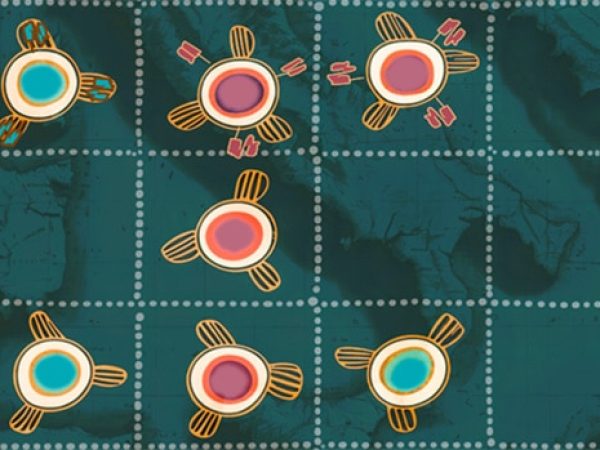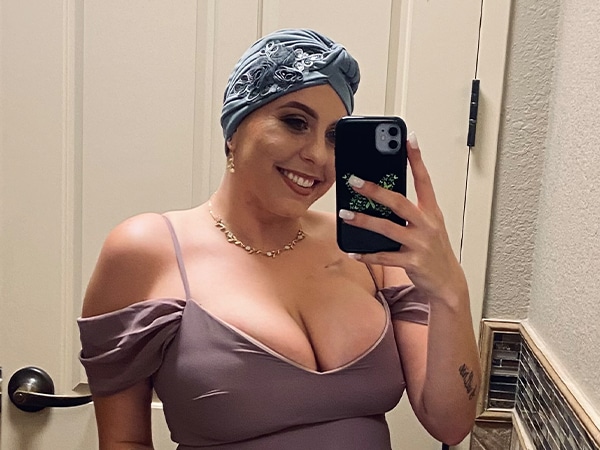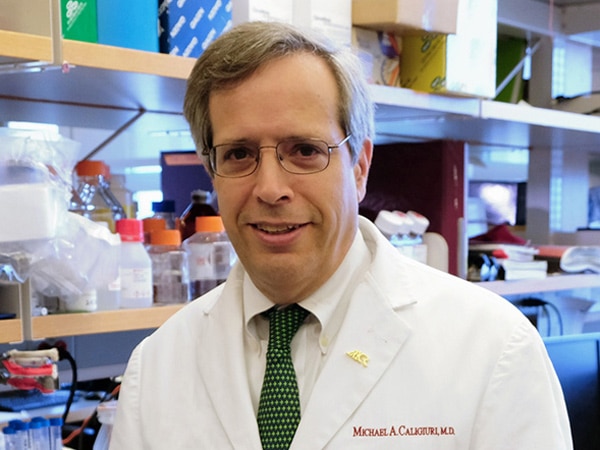Lucas Newell
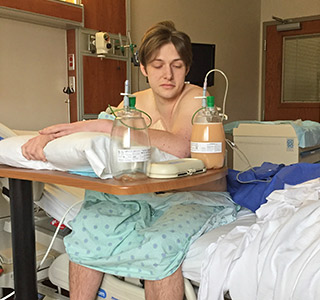
My name is Lucas and toward the end of February 2018, I was diagnosed with primary mediastinal large B-cell lymphoma. The entire experience is wild to think about now that I’m looking back on it.
I had a pretty regular life, my routine consisted of going to class, making bread at a nearby restaurant, and spending time with my girlfriend. Besides a poor sleep schedule, I felt fine until 48 hours before my trip to the emergency room. I woke up one morning with a noticeable amount of pressure that radiated upwards from my neck. This was accompanied by shortness of breath, which I assumed was due to exhaustion. The veins in my neck were bulging out to a point of concern and I decided that I would go see a physician in the morning. Following a night of looking up possible causes of my symptoms, I awoke to an increase in cranial pressure and a swollen face to go with it. At this point I was concerned that something was seriously wrong and decided to seek medical attention after I finished my shift at work. Roughly half an hour after getting into my work routine, I came close to passing out from trying to move a 50-pound clump of dough, something I’d done nearly every day for a year. I was taken to the ER and started my journey with cancer from there.
Diagnosis
After four hours of waiting in the emergency room with my dad, we were informed that I had a mass in my chest behind my sternum. I don’t remember having much of an emotional reaction to this, beyond knowing that whatever it was had to be serious. I was moved to an actual hospital room and for the next 20 or so days, I received many X-rays, procedures, and tests. After an inconclusive needle biopsy, I was put under anesthesia and had a more intensive biopsy that led to my lymphoma diagnosis. By this time everyone had already been convinced that it was some form of cancer, and understanding that mine was of lesser severity was a relief. Eventually, I was placed under the care of a brilliant oncologist, in the inpatient cancer section of the hospital to begin my treatment.
Treatment
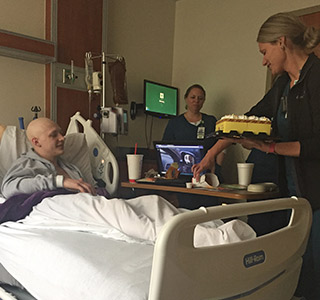
During my treatment, I spent four days at a time in the hospital while receiving chemotherapy around the clock. Chemotherapy proved far less taxing on my body than I thought it would be; boredom was one of the worst symptoms.
Prior to my second round of chemo, my left arm swelled up with fluid. That led to another ER admission and 14 days in the hospital. This time around, I was angry about the complications and I missed being at home. I received two thoracentesis procedures, which removed over 2 liters of fluid from the sac around my left lung. This fluid had been compressing my lung so much that I could barely use it to breathe.
Around this time, I also had a pericardiocentesis to remove a liter of fluid from the pericardial sac around my heart. Those were the last severe complications I had. After that I received the remaining four chemotherapy treatments in three-week intervals, finishing in June 2018.
Effects on Family
During the first long stay in the hospital I didn’t have much of an emotional reaction. I placed a lot of faith in my oncologist and surgeons and generally had a sense that everything would be OK. The hardest part was seeing how concerned and scared my family and my girlfriend were.
I had a bone marrow biopsy on my hip during the diagnosis stage. Aside from the extreme discomfort, the worst part was knowing that my mom was in the same room watching me go through a painful procedure. Everything instilled a sense of guilt in me. I didn’t want anybody to be worried about my health or stressing themselves out over my diagnosis.
The diagnosis itself was surreal. Nobody expects to develop cancer. For a while, it put a strain on my relationship with my girlfriend. Even though I wasn’t aware at the time, I started to isolate myself socially. I didn’t want to be around people, and I think I didn’t want anyone close to me to care about me at all. I still struggle with these issues today, and I’m thankful that my girlfriend stayed by my side. The patience and love that my friends, family, and medical care staff guided me through my treatments.
Effects on Me During Treatment
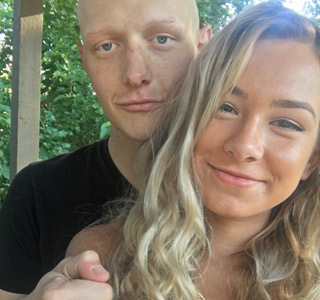
The effects of chemotherapy didn’t become apparent until my fourth round of treatment. By that time, I had lost a lot of muscle mass and didn’t move around very much. My lifestyle became sedentary, so aside from how I looked, I didn’t feel all that different. I still hung out with friends on occasion and managed to go out on a few dates with my girlfriend. I even enjoyed being bald for a while, until my eyebrows decided to jump ship. I spent a lot of time playing video games and reading.
Somewhere around my fourth treatment I started to experience a symptom called “chemo brain.” I could barely maintain a train of thought and couldn’t focus on anything for a long amount of time. My memory diminished as well, and I would have to be reminded of things even after being told three or four times. I also started having issues with completing simple tasks and remembering basic words. I found this to be extremely frustrating and probably the worst experience that I had to deal with throughout the entire journey.
Remission
On July 2018, my oncologist told me that the PET scan results showed no signs of any existing cancer and that I was officially in remission.
It’s hard on some levels to accept that I no longer have cancer. Sometimes it feels like five surreal months. My biggest battle right now is that my desire to fully recover outpaces my body and mind’s current abilities. One thing I’m sure that most cancer survivors can agree upon is that you must be extremely patient with yourself while recovering from the final treatment.
I believe that I have overcome one of the most straining circumstances that one can experience in life. Yes, I dodged a bullet by having an extremely treatable form of cancer, but the mental strain and frustration that came with it were more than I anticipated. I am officially cancer-free and I could not be prouder of my loved ones’ patience and perseverance throughout the entire journey.


